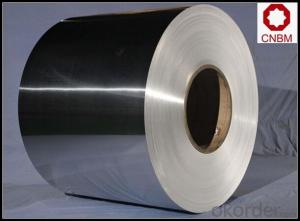Cold Rolled Aluminium Coil in Roll 1.5 mm 3104 3003
- Loading Port:
- Shanghai
- Payment Terms:
- TT OR LC
- Min Order Qty:
- 5 m.t.
- Supply Capability:
- 10000 m.t./month
OKorder Service Pledge
OKorder Financial Service
You Might Also Like
Item specifice
1. Specification of Cold Rolled Aluminium Coil in Roll 1.5 mm 3104 3003
1) Alloy | 1050, 1060,1100, 3003 3004 3105 3A21 5005 5052 etc |
2) Temper | O/H12/H14/H1/H18/H32/H34/H36/H38//H111/H112/H116/H321/T6/T651/T3/T351 etc |
3) Thickness | 0.1mm to 6mm |
4) Width | 20mm to 3300mm |
5) Coil weight | 100kgs to 6 tons depends on actual requirement |
6) Core material | Aluminum or paper |
7) Coil Inner diameter | 75mm, 150mm, 200mm, 300mm, 405mm, 505mm or as required |
8) Protective film can be added
2. Application of Cold Rolled Aluminium Coil in Roll 1.5 mm 3104 3003
(1).Interior: wall cladding, ceilings, bathrooms, kitchens and balconies, shutters, doors...
(2).Exterior: wall cladding, facades, roofing, canopies, tunnels,column covers , renovations...
(3).Advertisement: display platforms, signboards, fascia, shop fronts...
3. Feature of Cold Rolled Aluminium Coil in Roll 1.5 mm 3104 3003
*Such coil is specially designed to replace aluminum ingot, due to the high export tax of aluminum ingot, the coil has better price than ingot.
*This type of coil can fit customer's remelting furnace just like ingot, no need to make any change to the production line that was previously used for ingot. The standard coil size and weight is very suitable for the feed gate of furnace.
*This type of coil causes less material wastage than ingot when remelted.
*Our coil is made directly from ore, no need to go though the ingot making process, quality is much better than other suppliers who use ingot scrap to make coil.
Be free from Oil Stain, Dent, Inclusion, Scratches, Stain, Oxide Dicoloration, Breaks, Corrosion, Roll Marks, Dirt Streaks and other defect which will interfere with use
4. Certificate:
SGS and ROHS(if client request, paid by client), MTC(plant provided), Certificate of Origin(FORM A, FORM E, CO), Bureau Veritas and SGS (if client request, paid by client), CIQS certificate
5. Image of Cold Rolled Aluminium Coil in Roll 1.5 mm 3104 3003
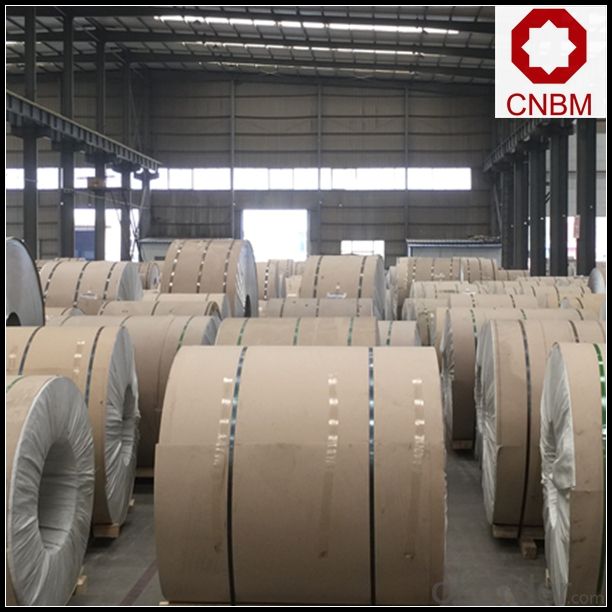
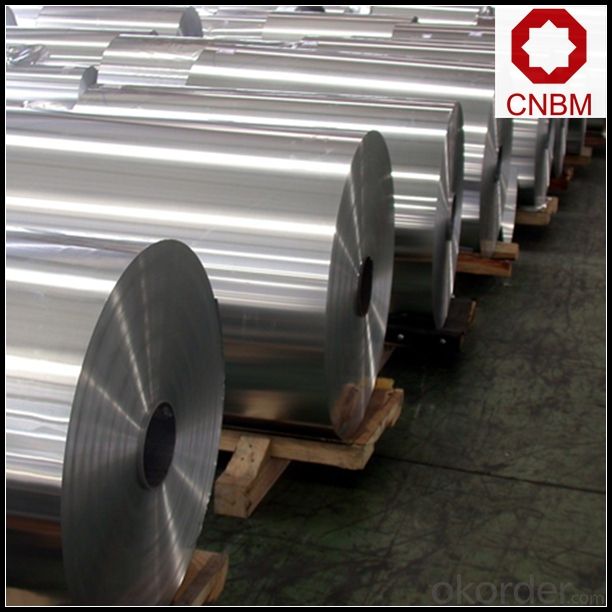
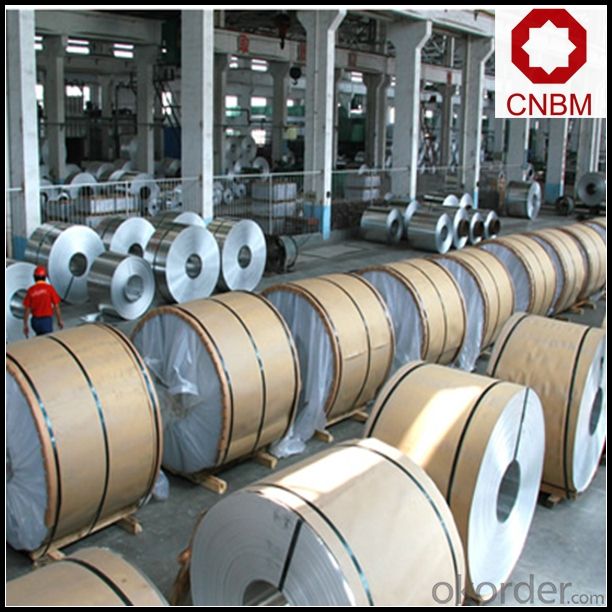
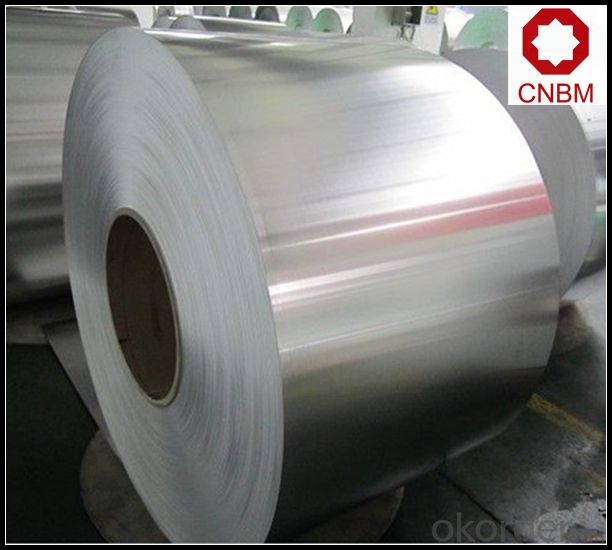
6. Package and shipping of Cold Rolled Aluminium Coil in Roll 1.5 mm 3104 3003
eye to wall
eye to the wall
with wood pallet (wooded case also available)
7. FAQ
1) What is the delivery time?
Dpends on actual order, around 20 to 35 days
2)What is the QC system:
We have QC staff of 20 persons and advanced equipment, each production is with MTC traced from Aluminum ingot lot.
3) What market do you mainly sell to?
Australia, America, Asia, Middle East, Western Europe, Africa etc
- Q:How do aluminum coils perform under high-temperature applications?
- Aluminum coils are known for their excellent heat resistance and performance in high-temperature applications. Due to their low melting point of around 660 degrees Celsius (1220 degrees Fahrenheit), aluminum coils can withstand and operate efficiently under elevated temperatures. Aluminum has a high thermal conductivity, meaning it can quickly transfer heat away from the coil, preventing overheating and potential damage. This property allows aluminum coils to effectively dissipate heat, resulting in improved thermal management and enhanced performance in high-temperature environments. Moreover, aluminum coils exhibit good corrosion resistance, which is crucial in applications where heat and moisture are present. The oxide layer that naturally forms on the surface of aluminum provides a protective barrier against corrosion, ensuring the longevity and reliability of the coil even in challenging conditions. Furthermore, aluminum coils are lightweight and possess excellent formability, allowing for easy installation and integration into various systems and applications. This versatility makes them suitable for a wide range of high-temperature applications, including heat exchangers, automotive components, HVAC systems, and electrical devices. However, it is important to note that extreme temperatures beyond the melting point of aluminum can cause the material to weaken or deform. Therefore, it is essential to consider the specific temperature requirements and limitations of the aluminum coil before implementing it in a high-temperature application.
- Q:Are there any specific regulations for the transportation of aluminum coils?
- Yes, there are specific regulations for the transportation of aluminum coils. These regulations typically include guidelines for securing the coils properly to prevent shifting or damage during transit. Additionally, there may be requirements for labeling, documentation, and handling procedures to ensure the safe transportation of aluminum coils.
- Q:Are aluminum coils suitable for high-gloss applications?
- Yes, aluminum coils are suitable for high-gloss applications. Aluminum has excellent reflective properties and can be easily polished to achieve a high-gloss finish. Additionally, aluminum is lightweight, durable, and resistant to corrosion, making it an ideal choice for a wide range of high-gloss applications such as automotive trim, signage, and decorative elements.
- Q:Are aluminum coils compatible with other materials?
- Yes, aluminum coils are compatible with other materials. Aluminum is a versatile and widely used material that can be easily integrated with various other materials in different applications. For example, aluminum coils can be used in conjunction with copper tubing in air conditioning and refrigeration systems to enhance heat transfer efficiency. Additionally, aluminum coils can be coated or laminated with other materials such as polymers or paints to provide additional protection against corrosion, improve aesthetics, or enhance specific performance characteristics. Therefore, aluminum coils offer compatibility with a range of materials, making them suitable for diverse applications in industries such as construction, automotive, aerospace, and more.
- Q:How do aluminum coils perform in applications where high strength is required?
- Aluminum coils are renowned for their outstanding performance in situations that demand strong materials. Despite being lightweight, aluminum possesses impressive strength characteristics, making it an ideal option for numerous industries. The alloy composition of aluminum coils is a key contributor to their exceptional strength. By incorporating elements like copper, magnesium, and zinc, aluminum alloys can be customized to enhance their strength. These alloying elements create intermetallic compounds that significantly boost the aluminum's strength without compromising its weight. Moreover, various manufacturing processes, such as hot or cold rolling, further enhance the strength of aluminum coils. These processes align the metal's grain structure, resulting in increased strength and resistance to deformation. As a result, aluminum coils can endure high levels of stress, making them suitable for applications that prioritize durability and reliability. Furthermore, aluminum coils display exceptional resistance to corrosion, which further enhances their performance in high-strength applications. Aluminum naturally forms a protective oxide layer on its surface, safeguarding it against corrosion and ensuring long-lasting durability. This corrosion resistance is particularly valuable in environments where high-strength materials are exposed to moisture, chemicals, or harsh weather conditions. Additionally, aluminum coils possess excellent thermal conductivity, enabling efficient heat dissipation in applications like heat exchangers or radiators. This property is crucial in industries that require high-strength materials to withstand elevated temperatures, as it helps prevent overheating and subsequent material degradation. In summary, aluminum coils are highly effective in high-strength applications due to their alloy composition, manufacturing processes, corrosion resistance, and thermal conductivity. Their combination of strength, lightweight design, and durability makes them a preferred choice in industries ranging from automotive and aerospace to construction and electrical.
- Q:Difference between aluminium roll gate and iron roll gate
- Structurally, there is no difference, but the aluminum roll gate weight is light, the motor needs little effect, save power; and the iron roll gate weight, motor power, electricity, but the door of high strength, better safety performance.
- Q:What are the different coil handling methods for aluminum coils?
- There are several coil handling methods for aluminum coils, including manual handling, fork truck handling, coil grabs, and coil tongs. Manual handling involves physically lifting and moving the coils by hand, while fork truck handling utilizes a forklift to transport and position the coils. Coil grabs and coil tongs are specialized tools that can be attached to lifting equipment to securely grip and lift the coils. These methods ensure safe and efficient handling of aluminum coils in various industrial settings.
- Q:Just want to know for any boat builders out there. I have been told by my local paddling store that there are no aluminum kayaks. Why couldn't i build one? it cant be weight, I would build the frame from 1/2 inch square aluminum tubing and the body out of 1/32 high grade sheeting. So why does something like this not exist?
- This Site Might Help You. RE: Why couldn't an aluminum kayak work? Just want to know for any boat builders out there. I have been told by my local paddling store that there are no aluminum kayaks. Why couldn't i build one? it cant be weight, I would build the frame from 1/2 inch square aluminum tubing and the body out of 1/32 high grade sheeting. So why does...
- Q:I have been trying to make some thermite for a while now, and I haven't had much success. I have tried using iron oxide and that didn't work. then I tried using manganese dioxide, also without success. I'm pretty sure I have the right proportions for each of the corresponding oxides, but it just isn't working. I am using magnesium ribbon to light it.The aluminum I am using is the byproduct of me trying to cut a block of aluminum with a hacksaw (best way I have available to cut it) and there is a lot of aluminum powder that is being made. But i'm not sure if it is fine enough to be effective. I don't have an etch-a -sketch so that's not an option. I know that it has to be fairly fine grained, but how small do the particles need to be?FOR EVERYONE WHO IS GOING TO TRY AND TELL ME THAT MAKING THERMITE IS DANGEROUS OR SOMETHING ALONG THOSE LINES......DONT!!!!!!!!.......... IM NOT GOING TO LISTEN SO SAVE YOURSELF THE TYPING AND ME THE READING
- In 35+ years of demonstrating the thermite reaction, I have used fine aluminium powder to quite visible small bits. The proportions don't seem too critical, but try and keep near the amounts represented by the balanced eqtn. The difficult bit is getting the wretched stuff to ignite. With some mixes several strands of magnesium ribbon as fuse still wouldn't get it to ignite. I found a pile of 'ignition powder' at the base of the Mg often helped. There was a good commercial one available in the UK but I often made one up, main ingredients barium peroxide and magnesium powder, about 50/50. Needless to say, ignite with this mix where you won't breathe any nasty fumes. To get a good result, if I didn't use a proper crucible, I shaped one of Al foil about the capacity of 2-3 eggcups. This was put on sand in a big coffee tin, then more sand added to fill round the sides. This would give a good amount of iron. I once made the mistake of rushing in too quickly to get out the red hot iron.... and completely melted the ends of a large pair of Nickel tongs!
- Q:What is the role of aluminum coils in the construction of power plants?
- Aluminum coils are commonly used in power plants for the construction of heat exchangers and condensers. These coils play a crucial role in facilitating the transfer of heat and efficiently cooling fluids within the power plant system. The lightweight and corrosion-resistant nature of aluminum makes it an ideal material choice for these applications, ensuring optimal performance and longevity of the power plant equipment.
1. Manufacturer Overview |
|
|---|---|
| Location | |
| Year Established | |
| Annual Output Value | |
| Main Markets | |
| Company Certifications | |
2. Manufacturer Certificates |
|
|---|---|
| a) Certification Name | |
| Range | |
| Reference | |
| Validity Period | |
3. Manufacturer Capability |
|
|---|---|
| a)Trade Capacity | |
| Nearest Port | |
| Export Percentage | |
| No.of Employees in Trade Department | |
| Language Spoken: | |
| b)Factory Information | |
| Factory Size: | |
| No. of Production Lines | |
| Contract Manufacturing | |
| Product Price Range | |
Send your message to us
Cold Rolled Aluminium Coil in Roll 1.5 mm 3104 3003
- Loading Port:
- Shanghai
- Payment Terms:
- TT OR LC
- Min Order Qty:
- 5 m.t.
- Supply Capability:
- 10000 m.t./month
OKorder Service Pledge
OKorder Financial Service
Similar products
New products
Hot products
Related keywords
